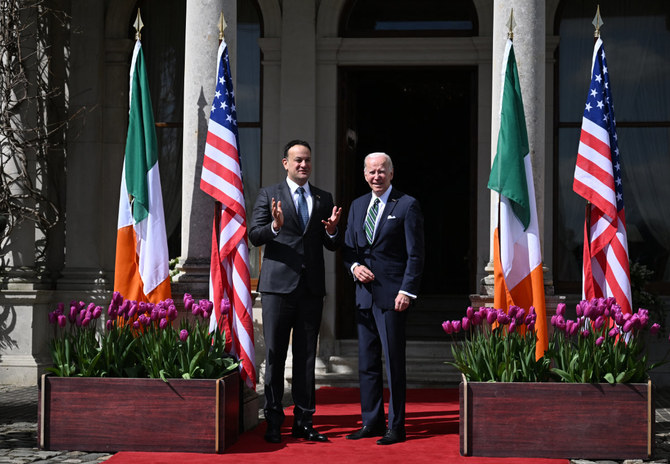Good Friday Agreement a gift that should keep on giving

https://arab.news/yrvwn
Like many Conservatives of my generation, I lost friends in the bombing of the Grand Hotel in Brighton in 1984, when an attempt was made to assassinate Prime Minister Margaret Thatcher as part of the 30 years of violence surrounding Northern Ireland from the 1960s onwards. The MP who worked in the office next door to mine at Westminster was killed. I also had constituents serving in the armed forces killed or wounded while both on and off duty. And I attended memorials for civilians, including children, who ultimately made up some of the 3,500 who lost their lives.
This background to my early years in parliament will not be unfamiliar to those who have experienced the miseries of civil conflict or war elsewhere. What may be unfamiliar, however, is that it came to an end. An atmosphere that had seemed like a fixed element of our lives, in which precautions against bombings and terror had to be built into our everyday existence, suddenly ceased to be necessary and a generation of children grew up for whom such things were unknown. I can think of many who might wish for the same.
Accordingly, the recent ceremonies to commemorate the signing of the negotiated settlement named the Good Friday Agreement in April 1998, marked by the visit of US President Joe Biden to Northern Ireland, a part of the UK, and to the Republic of Ireland, the UK’s closest neighbor, were not overhyped. Together with the EU, they had all been key elements of the negotiating process that painstakingly built trust where there had been none and enabled murderous paramilitary forces to stand down through a complex set of compromises. In a world where conflicts now last longer than ever, and where a failure to compromise condemns millions to a miserable, fearful existence, such successes deserve study.
The impact on UK politics was quite profound. The agreement gave immense stature to Prime Minister Tony Blair, not only for the conclusion, but also for his generous sharing of the success, including with political opponents such as previous Prime Minister John Major, on whose patient and brave work he built. It helped ensure another landslide electoral success for Blair in 2001. He, like Thatcher, did not lose any of the three general elections he contested as a party leader.
It may also have emboldened Blair in other respects. A more interventionist foreign policy, as seen from his government in the Balkans in 1999 and in Sierra Leone in 2002, may have resulted from a confidence that boldness in challenging a defeatist status quo was a policy worth pursuing.
One of the inevitable after-effects of peace can be complacency — a forgetting of what had gone before and a carelessness of consequence
Alistair Burt
The close relationship necessary with the US, whose envoy George Mitchell was crucial to the success of the Good Friday Agreement, was cemented through the active support of President Bill Clinton. Without the support of the US, not only in the agreement itself but in its subsequent economic and political support to Northern Ireland, peace would not have had the foundations it did. In considering what weighed upon Blair’s mind in support of the next president, George W. Bush, as he contemplated tackling Saddam Hussein in Iraq, this genuine gratitude for what was achieved in the Good Friday Agreement thanks to the efforts of the US might have played a part.
In time, one of the inevitable after-effects of peace can be complacency — a forgetting of what had gone before and a carelessness of consequence. Ireland and Northern Ireland were scarcely part of the Brexit argument in the rest of the UK, displaying what was, in hindsight, an astonishing lack of awareness that the only land border the UK would have with the EU was the very border that had been at the heart of the conflict ended by the Good Friday Agreement. The disruption of the relationship with the EU has meant years of both political and physical problems since the UK formally left, which only now under new Prime Minister Rishi Sunak appear to be moving toward a better conclusion, which was deliberately referenced by Biden.
It is not too late for the Good Friday Agreement to have yet more impact. Other conflicts of land, identity, faith and divided peoples cry out for an approach in which leaders are prepared to put the past behind them to deliver a different future for their people. I have seen for myself the impact of contact between the protagonists of yesterday and those in conflicts today, telling the stories that only they can — like talking to like — and how security comes not from a gun, violence, a wall, separation or a checkpoint, but through working together on, and delivering, peace.
The Israel-Palestine conflict, among others, cries out for nothing more than a repetition of the patient, selfless example of those who made peace in Northern Ireland and garnered the support of the world in doing so. It is surely never too late to try again.
• Alistair Burt is a former UK Member of Parliament who has twice held ministerial positions in the Foreign and Commonwealth Office — as Parliamentary Under Secretary of State from 2010 to 2013 and as Minister of State for the Middle East from 2017 to 2019. Twitter: @AlistairBurtUK









































